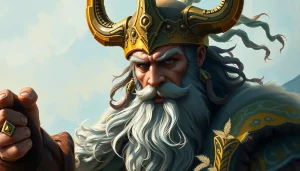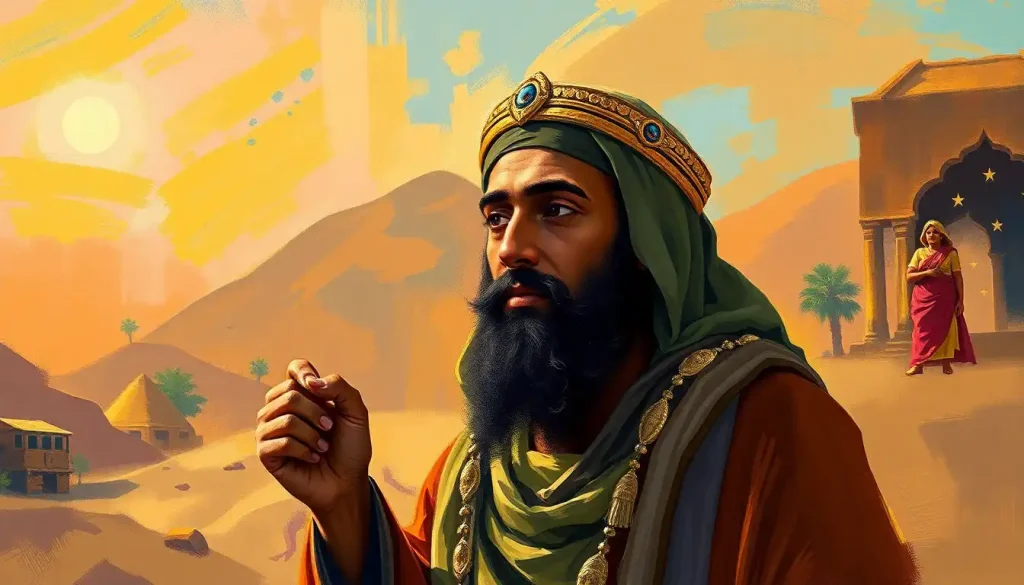While ancient mariners cast their fortunes to the waves and Viking merchants bartered their way across treacherous seas, one Norse deity held the power to transform their desperate prayers into glittering prosperity. In the vast pantheon of Norse mythology, where gods and goddesses wielded elemental forces and shaped the fate of mortals, there stood a figure of particular importance to those who sought wealth and abundance: Njord, the Norse god of wealth.
The Norse pantheon, with its rich tapestry of deities and legends, has captivated imaginations for centuries. From the thunderous might of Thor to the cunning wisdom of Odin, these gods embodied the values and aspirations of the Viking people. Yet, in a culture where prosperity was often synonymous with survival, Njord occupied a unique and revered position.
Wealth in Viking society was not merely a matter of material possessions. It represented security, influence, and the ability to provide for one’s family and community. Gold, silver, and valuable trade goods were the lifeblood of Viking economy, fueling their expansive voyages and ambitious conquests. In this context, Njord emerged as a pivotal figure, a divine patron of those who sought to navigate the perilous waters of commerce and fortune.
Njord: The Norse God of Wealth and Prosperity
Njord’s origins are as intriguing as the treasures he was believed to bestow. Born into the Vanir, a group of gods associated with fertility, wisdom, and the ability to see the future, Njord was destined for greatness from the start. His lineage set him apart from the Aesir, the more warlike gods led by Odin, and imbued him with a unique set of attributes that would make him indispensable to both gods and mortals alike.
The sea was Njord’s domain, and it was through this vast, unpredictable realm that he exercised his influence over wealth and prosperity. In a world where maritime trade was the lifeblood of economy, Njord’s power was unparalleled. He could calm stormy waters, guide ships safely to harbor, and ensure bountiful catches for fishermen. These abilities made him a natural patron of sailors, merchants, and anyone whose livelihood depended on the sea’s bounty.
Symbolically, Njord was often represented by ships, fishing nets, and gold coins – all emblems of the wealth he could bestow. His very name evoked images of abundance, with some scholars suggesting it meant “the nourishing one.” This nurturing aspect of Njord’s character set him apart from other wealth deities, such as the Greek God of Wealth, Plutus, who was often portrayed as blind and capricious in his distribution of riches.
Njord’s Role in Norse Mythology
Among the Vanir gods, Njord held a position of great respect and influence. When the Aesir and Vanir gods engaged in a fierce war, it was Njord who played a crucial role in brokering peace. As part of the truce, he was sent to live among the Aesir as a hostage, along with his children. This diplomatic move not only ended the conflict but also integrated Njord’s wealth-bringing powers into the broader Norse pantheon.
One of the most fascinating chapters in Njord’s story is his marriage to Skadi, the giantess. This union was born out of unusual circumstances – Skadi had come to Asgard seeking vengeance for her father’s death, but was offered marriage to one of the gods as compensation. She chose Njord, sight unseen, by selecting his feet from a lineup. This marriage, however, was destined for trouble.
Skadi, a mountain-dwelling giantess, could not bear the sound of the sea and the cries of the seabirds at Njord’s coastal home. Likewise, Njord found no peace in Skadi’s snowy mountain abode. Their compromise – to split their time between both realms – speaks to the delicate balance between different sources of wealth and prosperity in Norse culture.
Njord’s children, Freyr and Freyja, would go on to become important deities in their own right. Freyr became associated with fertility and peace, while Freyja embodied love, beauty, and even a certain type of magic. Together, this divine family represented a powerful triad of prosperity, encompassing material wealth, abundance in nature, and the richness of human relationships.
Worship and Rituals Associated with Njord
The worship of Njord was widespread throughout Scandinavian coastal regions, where his influence over the sea and trade was most keenly felt. Temples dedicated to Njord were often situated near harbors or along important trade routes, serving as focal points for both religious devotion and commercial activity.
One of the most famous temples to Njord was located in Njarðarlög, Iceland, a name that literally means “Njord’s district.” This site, mentioned in several Norse sagas, was renowned for its wealth and the prosperity it brought to the surrounding area. The very existence of such a prominent place of worship underscores Njord’s importance in Viking society.
Offerings to Njord were as diverse as the forms of wealth he could bestow. Gold and silver were common sacrifices, symbolizing the material riches sought by his worshippers. However, items related to seafaring and fishing were equally valued – model ships, fishing nets, and even fish themselves were presented as gifts to the god. These offerings reflected the dual nature of Njord’s domain: the sea itself and the wealth it could provide.
Festivals honoring Njord often coincided with important dates in the maritime calendar. The start of the fishing season or the departure of trading fleets were occasions for grand celebrations, where entire communities would come together to seek Njord’s blessing. These events were not just religious ceremonies but also social gatherings that strengthened community bonds and reinforced the shared values of prosperity and abundance.
Njord’s Influence on Viking Society and Economy
Njord’s impact on Viking society extended far beyond the realm of religious worship. As the patron deity of maritime trade and commerce, he played a crucial role in shaping the economic landscape of Scandinavia and beyond. The Vikings’ reputation as fearsome raiders often overshadows their equally important role as skilled traders and merchants. It was in this latter capacity that Njord’s influence was most profoundly felt.
Coastal communities, in particular, owed much of their prosperity to Njord’s perceived blessings. Fishing villages looked to him for bountiful catches, while trading ports sought his favor for safe and profitable voyages. The success of these communities had a ripple effect throughout Viking society, fueling economic growth and cultural exchange.
Invocations to Njord were a common practice among seafarers embarking on long voyages. These prayers were not just for wealth but also for safety and good fortune. In the treacherous waters of the North Atlantic, where storms could spell disaster for even the most seasoned sailors, Njord’s protection was seen as essential. This spiritual aspect of maritime life highlights the deep interconnection between religious belief and practical concerns in Viking culture.
The concept of “luck” in Norse society was closely tied to divine favor, and Njord was seen as a generous dispenser of this crucial quality. A merchant or sailor known for their success might be said to have Njord’s luck, a reputation that could open doors and create opportunities in the competitive world of Viking commerce.
Comparing Njord to Other Wealth Deities in World Mythologies
While Njord stands unique in Norse mythology, parallels can be drawn with wealth deities from other cultures. The Greek god Poseidon and the Roman god Neptune, both rulers of the sea, share some similarities with Njord. However, while Poseidon and Neptune were often portrayed as temperamental and dangerous, Njord was generally seen as a more benevolent figure, more closely aligned with prosperity than with the sea’s destructive power.
Interestingly, the connection between sea gods and wealth is not unique to European mythologies. The Japanese God of Wealth, Ebisu, is also associated with the sea and fishing, highlighting a common thread in the mythologies of seafaring cultures.
What sets Njord apart is his specific association with trade and commerce, aspects not typically emphasized in the portfolios of other sea deities. This focus on the economic aspects of maritime activity reflects the Viking culture’s deep engagement with trade networks that spanned continents.
Unlike the Buddhist God of Wealth, Jambhala, who is often depicted as a protector against poverty, Njord was seen more as an active promoter of prosperity. His role was not just to ward off destitution but to actively increase the wealth and success of his followers.
The Greek Goddess of Wealth, Plutus (often conflated with the male god of the same name), shares some similarities with Njord in terms of being associated with abundance. However, Plutus was often portrayed as blind, distributing wealth without regard to merit, while Njord’s blessings were seen as more discerning, favoring those who showed skill and daring in their maritime endeavors.
Njord’s Legacy in Modern Times
The enduring legacy of Njord extends beyond the realms of ancient mythology and into the modern world. In contemporary Norse paganism, often referred to as Ásatrú or Heathenry, Njord continues to be revered as a god of prosperity and abundance. Modern practitioners often invoke Njord in matters related to financial success, particularly in businesses or careers connected to the sea or trade.
The attributes associated with Njord – wisdom in commerce, skill in navigation, and the ability to find abundance even in challenging circumstances – resonate strongly in today’s global economy. In a world where international trade and economic interdependence are more crucial than ever, the principles embodied by Njord remain remarkably relevant.
Moreover, Njord’s connection to the sea takes on new significance in an era of increasing environmental awareness. As modern societies grapple with issues of sustainable fishing and the health of our oceans, Njord’s role as a protector of marine resources offers a mythological perspective on these contemporary concerns.
The story of Njord also provides valuable insights into the Viking worldview, challenging simplistic notions of Norse culture as solely focused on warfare and plunder. It reveals a society that valued trade, diplomacy, and the accumulation of wealth through skill and daring rather than just through force.
In conclusion, Njord, the Norse god of wealth, stands as a fascinating figure in the pantheon of mythological deities associated with prosperity. His domain, spanning the realms of sea, trade, and abundance, reflects the complex relationship between wealth and risk in Viking society. Unlike the Roman God of Wealth, Plutus, who was often portrayed as capricious, or the Chinese God of Wealth, who is typically associated with more general concepts of prosperity, Njord’s influence was deeply rooted in the practical realities of maritime commerce.
The worship of Njord reminds us that in many ancient cultures, wealth was not seen merely as an end in itself, but as a means of ensuring survival, fostering community, and achieving greatness. His story intertwines with the broader narrative of Viking expansion and trade, highlighting the sophisticated economic systems that underpinned Norse society.
As we navigate our own economic seas in the modern world, the figure of Njord offers a compelling reminder of the age-old human quest for prosperity and the deep cultural significance we attach to wealth. Whether viewed through the lens of mythology, history, or contemporary spirituality, Njord’s legacy continues to offer insights into our relationship with wealth, risk, and the vast, unpredictable forces that shape our fortunes.
References:
1. Lindow, J. (2001). Norse Mythology: A Guide to the Gods, Heroes, Rituals, and Beliefs. Oxford University Press.
2. Simek, R. (1993). Dictionary of Northern Mythology. D.S. Brewer.
3. Davidson, H.R.E. (1964). Gods and Myths of Northern Europe. Penguin Books.
4. Price, N. (2020). Children of Ash and Elm: A History of the Vikings. Basic Books.
5. Turville-Petre, E.O.G. (1964). Myth and Religion of the North: The Religion of Ancient Scandinavia. Holt, Rinehart and Winston.
6. Orchard, A. (1997). Dictionary of Norse Myth and Legend. Cassell.
7. DuBois, T.A. (1999). Nordic Religions in the Viking Age. University of Pennsylvania Press.
8. Sturluson, S. (13th century). The Prose Edda. Translated by Jesse Byock (2005). Penguin Classics.
9. The Poetic Edda. Translated by Carolyne Larrington (2014). Oxford World’s Classics.
10. Winroth, A. (2014). The Age of the Vikings. Princeton University Press.












Would you like to add any comments? (optional)